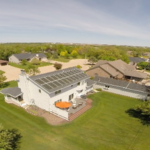
Threats to Iowa Energy Efficiency Programs
Current rulemaking at the Iowa Utilities Board will implement changes to Iowa’s energy efficiency programs. The rulemaking is primarily intended to implement changes made to Iowa code by SF 2311, the bill that cut efficiency programs passed in 2018. However, the rulemaking goes further than the law and makes changes that could have further negative impacts on energy efficiency in Iowa. You can find the comments submitted jointly by the Environmental Law and Policy Center and the Iowa Environmental Council in the rulemaking docket HERE.
At this point in time none of the issues being raised have been addressed. To summarize, the proposed rules will lead to programs that are less effective, robust, and accountable. They go beyond changes in SF 2311 (2018) by:
- removing language that implementing energy efficiency is to be “of the highest priority” for the Board. Instead, the rule says the purpose is simply to establish requirements for energy efficiency and demand response plans.
- eliminating definitions that are critical to the development and implementation of energy efficiency and demand response plans and programs. Rather than defining the terms, they are left to interpretation (see link to our comments for specific definitions of concern).
- eliminating reference to the Board setting capacity and energy performance standards. This requirement is in statute, but the proposed rules would no longer define this as an outcome of a contested case hearing.
- removing required components of assessment of potential studies. Existing rules specify numerous components that must be included, such as a range of available and emerging energy efficiency technologies and practices. The proposed rules do not provide any detail.
- eliminating the requirement to report on collaboration with stakeholders. This makes stakeholder engagement a formality instead of a productive process.
- allowing the use of tests other than the societal test to evaluate cost-effectiveness. Other tests can have the effect of externalizing costs and ignoring benefits.
- failing to exclude educational programs from cost-effectiveness tests. Statute explicitly requires excluding these programs from the tests.
- relying on avoided costs from a different type of case filing for purposes of energy efficiency. This functions to under-value the long-term benefits from efficiency.
- shifting burden of proof from the utility to outside parties in determining whether the plan includes all reasonable actions. The utility has the most information about potential actions and should have to prove they are being taken.
- eliminating requirements for the utility to file load forecasting and class load information. This information is essential in reviewing the energy efficiency and demand response plans. Statute still requires this to be submitted, and the proposed rule deletes the existing detail about what to submit.
- no longer requiring reports on coordination between utilities in energy efficiency. This report successfully encouraged coordination.
- eliminating flood lighting requirements, despite existing statutory language on the issue. The existing rule is consistent with statute and has led to improvements in lighting efficiency while the proposed rule will take Iowa backwards.
These are contrary to best practices developed over the years and leave many details that have been settled in the past open to interpretation.
All Iowa residents are encouraged to contact the Iowa Utilities Board with comments in the docket through the IUB’s electronic filing system HERE.
The docket number is RMU-2016-0018 and the order with the proposed rule can be found HERE.
To submit comments, go to “submit filing” at the top of the page. You can submit as a guest or register as a user. Your comments need not be extensive nor cover all of the issues listed. These issues are not receiving adequate consideration and we hope that receiving even a few more comments on some of these problems will elevate their importance with the Board and staff.

 Previous Post
Previous Post Next Post
Next Post